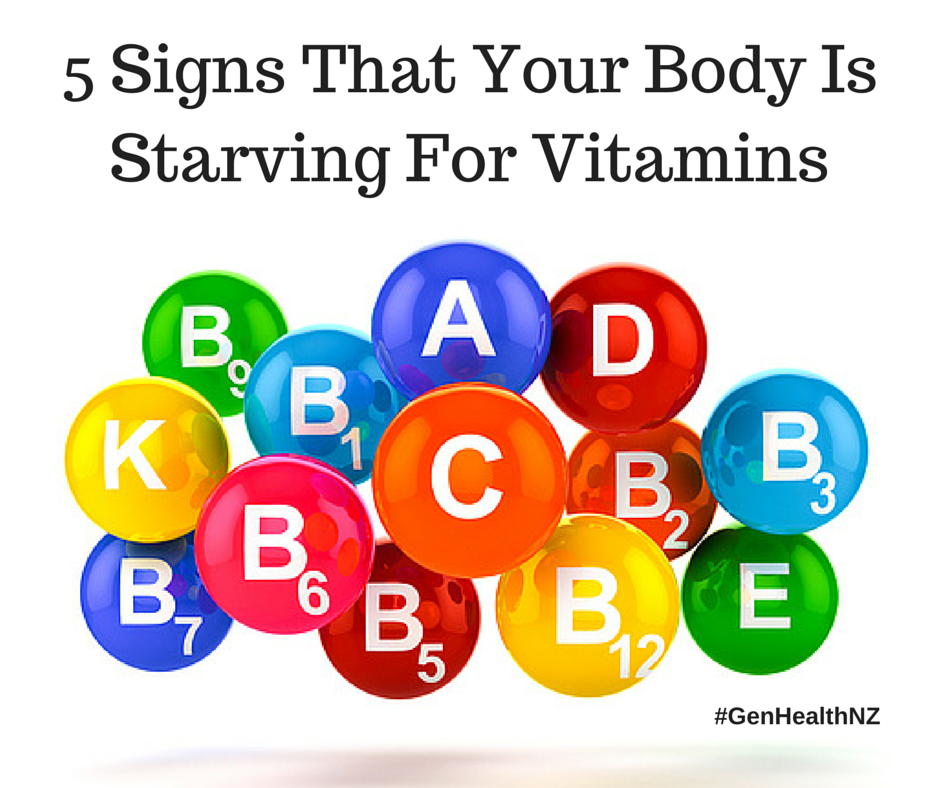
It’s easy to become vitamin-deficient, usually by not eating enough of the right foods or not absorbing them properly due to digestive issues. But even by eating enough of the right foods you can still fall short.
In the most recent National Nutrition Survey, only half of New Zealanders consumed the recommended 5+ servings of fruit and veggies per day. Thats the minimum servings required to prevent acute deficiencies.
In the long term, vitamin and mineral deficiencies manifest as chronic degenerative diseases such as cancer, heart disease, stroke, diabetes, obesity not limited to this list and of which 9 out of 10 adults will suffer from in their lifetime.
In the short term you may not get a disease, but you can end up with impaired functioning, because vitamins are cofactors for all the biochemical reactions in the body. We need them in order to function properly.
That impaired functioning can sometimes manifest in mysterious ways. It’s your bodies way of communicating to you that it needs help.
Here are five unusual warning signs that you may be vitamin-deficient.
The good news: Most are fixable with dietary tweaks and supplementation—all the more reason to make nutrition a top priority.
Sign No. 1: Cracks at the corners of your mouth.
The Deficiency: Iron, zinc, and B vitamins like niacin (B3), riboflavin (B2), and B12. It’s common if you’re a vegetarian to not get enough iron, zinc, and B12.
The Fix: Eat more poultry, salmon, tuna, eggs, oysters, clams, sun-dried tomatoes, Swiss chard, tahini, peanuts, and legumes like lentils. Iron absorption is enhanced by vitamin C, which also helps fight infection, so combine these foods with veggies like broccoli, red bell peppers, kale, and cauliflower.
Sign No. 2: A red, scaly rash on your face (and sometimes elsewhere) and hair loss.
The Deficiency: Biotin (B7), known as the hair vitamin. While your body stores fat-soluble vitamins (A, D, E, K), it doesn’t store most B vitamins, which are water-soluble.
The Fix: Reach for more cooked eggs (cooking deactivates avidin which inhibits the body’s ability to absorb biotin), salmon, avocados, mushrooms, cauliflower, soybeans, nuts, raspberries, and bananas.
Sign No. 3: Red or white acne like bumps, typically on the cheeks, arms, thighs, and butt.
The Deficiency: Essential fatty acids and vitamins A and D.
The Fix: Increase healthy fats. Focus on adding more salmon and sardines, nuts like walnuts and almonds, and seeds like ground flax, hemp, and chia. For vitamin A, pile on leafy greens and colourful veggies like carrots, sweet potatoes, and red bell peppers. These foods provide beta carotene, a precursor to vitamin A, which your body will use to make vitamin A.
Sign No. 4: Tingling, prickling, and numbness in hands, feet, or elsewhere.
The Deficiency: B vitamins like folate (B9), B6, and B12. These symptoms can be combined with anxiety, depression, anemia, fatigue, and hormone imbalances.
The Fix: Seek out spinach, asparagus, beets, beans (pinto, black, kidney, lima), eggs and poultry.
Sign No. 5: Crazy muscle cramps in the form of stabbing pains in toes, calves, arches of feet, and backs of legs.
The Deficiency: Magnesium, calcium, and potassium. If it’s happening frequently, it’s a tip-off that you’re lacking in these. If you’re training hard, you can lose more minerals (and water-soluble B vitamins) through heavy sweating.
The Fix: Eat more bananas, almonds, hazelnuts, squash, cherries, apples, grapefruit, broccoli, bok choy, and dark leafy greens like kale, spinach, and dandelion.
I recommend taking the True Health Assessment by USANA Health Sciences. They give you a personalised supplement regime plus a detained health action plan.
If you need any specific nutrition advice or coaching we’d love to hear from you. Click here to request a call from us
Yours in Health
Tarryn Thompson
No Comments to "5 Signs That Your Body Is Starving For Vitamins"